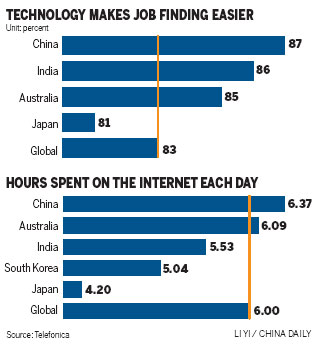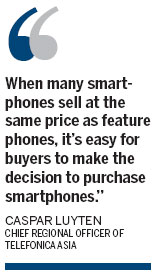


Chinese millennials are heavy users of technology, with most owning smartphones and preferring the Internet for communication, a survey has found.
About 92 percent of Chinese aged 18 to 30 own smartphones, well above the global average of 67 percent, said the joint survey by Spain-based telecommunications giant Telefonica SA and the Financial Times newspaper.
"Clearly, millennials are the smartphone generation," said Caspar Luyten, chief regional officer of Telefonica Asia. The high smartphone penetration rate in China will keep young people connected to the Internet where they can acquire content at any time, he added.
People born between the mid-1980s and late 1990s are considered millennials. They grew up with the Internet, and they are heavy users of social networks.
China has about 270 million people aged 18 to 30, figures from the National Bureau of Statistics show.
The country's position as the world's major smartphone maker, combined with its rapid growth, has fueled smartphones' popularity, Luyten said.
"When many smartphones sell at the same price as feature phones, it's easy for buyers to make the decision to purchase smartphones," he said.
China overtook the United States as the world's biggest smartphone market by shipments two years ago.
About 95 percent of mobile phones shipped in China will be smartphones by 2017 and the country will become one of the world's top smartphone markets (after the US and the European Union) in terms of the penetration rate, according to industry consultancy Canalys.
Domestic smartphone makers were among the first to see the business value of the nation's millennial population.
Yulong Computer Telecommunication Scientific Co Ltd, maker of Coolpad smartphones, has been among the most active in targeting the millennials.
Accounting for 11.6 percent of the smartphones sold in April, the Shenzhen-based Yulong is the biggest domestic cellphone manufacturer by sales, according to Sino Market Research.
Most of Yulong's devices cost about 1,000 yuan ($163), a widely accepted level for young buyers.
Different millennials
More than 90 percent of Chinese millennials are optimistic about China's economic prospects, while only 12 percent of their counterparts in Japan think the best days for the Japanese economy are yet to come.
This finding reflects the current economic situation, with developing markets growing faster than the developed regions.
However, while an increasing number of tech-savvy millennials in China are embracing the hottest technologies, they are modest about their tech skills.
Merely 10 percent of the nation's millennials strongly agree they are on the cutting edge of technology, compared with 19 percent worldwide.
Only 16 percent describe their personal knowledge and comfort with technology as excellent, versus the global average of 30 percent.
"Each country's millennials are different, but because of globalization, social media, the export of Western culture and the speed of change, millennials worldwide are more similar to one another than to older generations within their nations," said the cover story of the May 9 issue of Time magazine.
Luyten said the survey will help companies better understand the emerging young generation and provide more targeted products and services to them.
 Wheat harvest season in China
Wheat harvest season in China
 HK's new cruise terminal receives luxury liner
HK's new cruise terminal receives luxury liner
 Future points to carbon trading
Future points to carbon trading
 Seafood businesses flounder amid spending cut
Seafood businesses flounder amid spending cut
 Equities slump amid slow-growth estimates
Equities slump amid slow-growth estimates
 Auto show opens with much fanfare in Xi'an
Auto show opens with much fanfare in Xi'an
 Sunnylands summit fuels Chinese tourism interest
Sunnylands summit fuels Chinese tourism interest
 'Palace on wheels' on sale for $3.13m in Dubai
'Palace on wheels' on sale for $3.13m in Dubai